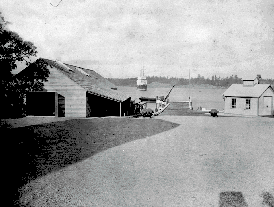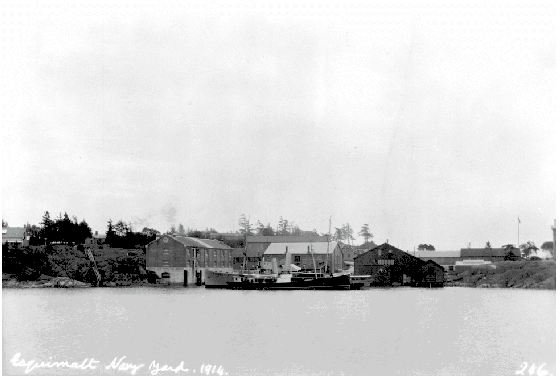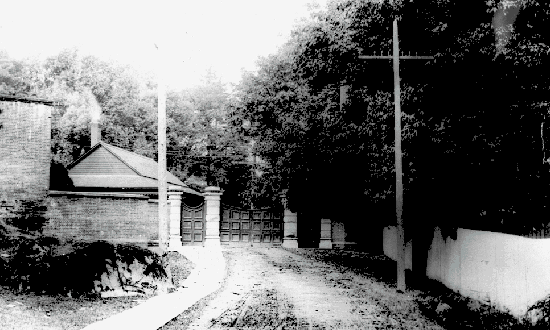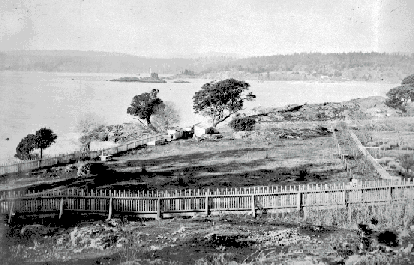| Race, Class, and Murder |
1861
On January 2, 1861, cries rang out in the wee hours of the morning in Esquimalt town. Witnesses heard arguing, a gunshot, shouts of murder, and then silence. The next morning a young child discovered a body in the backyard of his father's house. A sailor from the HMS Plumber lay dead and a Wells Fargo Express driver would confess the following day. Within a month, the trial would be held and the murderer would walk out of the courthouse a free man. What transpired that night and why did a murderer go free? The answers were never found, but the case is certainly an intriguing one.
Mr. William Millington was a respectable, upstanding citizen. He was almost considered a founding father of Victoria because of the length of time he had been there. The father of three young children, Millington was a landowner with a considerable amount of property. By the winter of 1860/1861 he had lived in the colony for 10 years. In the early hours of January 2, 1861 a disagreement broke out between Mr. Millington and another man. Soon the other man would be dead, a victim of murder. The man was Robert Coombs, a violin player and popular blue jacket about the HMS Plumber. What happened that night has been pieced together through the testimonies of neighbours who heard the events of the evening or who spoke with Mr. Millington shortly thereafter.
Witnesses claim that they heard cries of murder early in the morning on January 2nd. There were reports that both Millington and Coombs had been drinking together at the saloon and had left with each other. Witnesses report they were arguing with each other after they left. The Millington's nurse, Mary Ann Vine, reported being awoken in the night by the sounds of horses outside and the quarreling of two men. She said she heard Mr. Millington say "Get off my horse" . . . and then the man struck Millington and was knocked down. When questioned as to how she knew Mr. Coombs had been struck down, she replied the blow had been loud enough for her to hear. Mr. Millington reportedly entered the house to retrieve a pistol, before retuning to Mr. Coombs and firing the fatal shot. The cry of "murder" was heard, but no one responded.
Mr. Millington fled the crime scene, spending the night hiding out in the woods before turning himself in. Other witnesses came forward, testifying that Millington was quite drunk that night and that they had spoken to him the morning afterwards, at which time he told several people he had killed a man. The body was found early in the afternoon, January 2nd by one of Millington's children, who found the body and ran to get the saloonkeeper, Mr. Fred. Williams. The body, it was discovered, lay between two piles of logs and was partially concealed with boughs from trees. The arms were raised in a position of defense. There was a single wound, found on Mr. Coombs back near his shoulder. After an autopsy, it was revealed the bullet had passed through his shoulder to lodge in his heart, killing him almost instantly. Coombs was in his early thirties when he met his death.
The trial took place January 29th, 1861. Chief Justice David Cameron presided. Mr. Millington pleaded "Not Guilty". The prosecution and the defense presented their cases. Mary Ann Vine, the Millington's nurse, was the first to testify. She told what she remembered form the evening - the sounds of the horse and the shouts that woke her from her sleep, the voices she heard, and the sounds that accompanied them. She recalled Mr. Millington returned to the house to get his pistol and it was after that that she heard a shot fired, accompanied by the cry of "murder", repeated three times. Several more witnesses were brought forward, each testifying to what they had witnessed that night. Mr. William Ramsey, a doctor, also testified, as did a sergeant who was on the case.
By evening the jury had reached their verdict. Mr. Millington was clearly expecting the worst, looking pale but firm as he awaited their decision. Judge Cameron took his seat and brought the court to order. Total silence filled the courtroom as they jury was asked if they had reached their verdict. They had. Judge Cameron asked if they found Mr. Millington guilty or innocent of the crime for which he had been accused. The stunning verdict came back "Not guilty." Mr. Millington rose to his feet happily, shaking the hands of his defense team. Judge Cameron discharged Mr. Millington and he left immediately to join the few friends who had awaited the verdict all day. The packed courtroom slowly dispersed and the people went home. Mr. Millington was free to go, innocent in the eyes of the law.
People were outraged by the verdict in what had seemed an airtight case. British Colonist editor Amos de Cosmos openly condemned the decision in an editorial written just a few days after the trial. Others, too, were puzzled. How could a confessed murdered go free? Was it a case of wealth and status paying off? Why had the jury decided Mr. Millington was innocent, despite all the evidence? If Mr. Coombs was a horse thief, were Mr. Millington's actions justifiable? Could the thought of sentencing Mr. Millington to death have cause the jury to chose a "Not Guilty" verdict, instead of guilty? These questions cannot clearly be answered. Those who were there have long since passed away. Victoria is far from the tiny colony it once was.
For me, I believe this is a case in which prejudices of the time can be seen, prejudices that are still with us today. Mr. Millington was a popular, wealthy landowner and Mrs. Coombs, though well liked, was just a sailor. The evidence clearly showed that Mr. Millington was guilty. He confessed to the crime a number of times. Those he confessed, witnesses were brought to testify at his trial and yet he still walked out of the courtroom a free man. I think this trial is interesting because it shows that wealth and power really do pay off. Despite all the evidence, and Mr. Millington's own confessions, I believe he was found "Not Guilty" because of the position he held in the small colony. In looking at this case and how it was handled, we are given a glimpse into Victorian society in 1861. Though the death penalty is no longer a part of legal proceedings, it is interesting to note if the thought of sending Mr. Millington to his death might have influenced the jury. Unfortunately, without hearing from the jurors themselves, this can only be speculation, but it is certainly something to consider. If they knew Mr. Millington, they might have chosen to find him "not guilty" to spare him from death. Mr. Millington was clearly guilty, and yet he walked free. Why? Only the jury can truly answer that. It is, however, an interesting case study into how murder was treated in Victoria in the 1860's.

There was also a surprising lack of court documents surrounding the case. Only one notation of the case against William Millington was found. Considering the prominence of Mr. Millington in colonial Victoria, it is surprising that there is almost no mention of the case beyond the newspaper articles. I could find no bench notes or court recordings, though in another case that took place not long after, I came across numerous documents that related to the case. Perhaps the documents for Mr. Millington's case simply did not survive and have been lost over time.
To view photos and read newspaper articles concerning the evens of 1861 go to the Sources page


